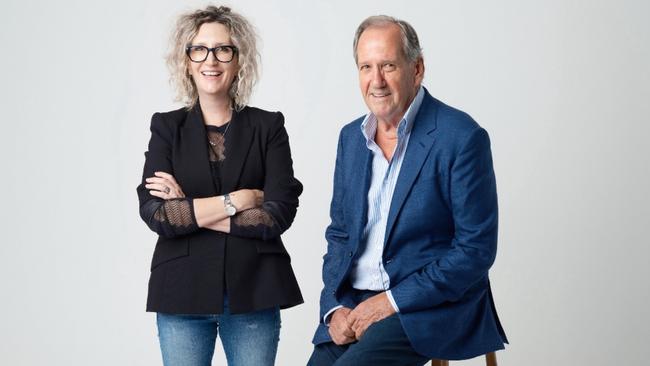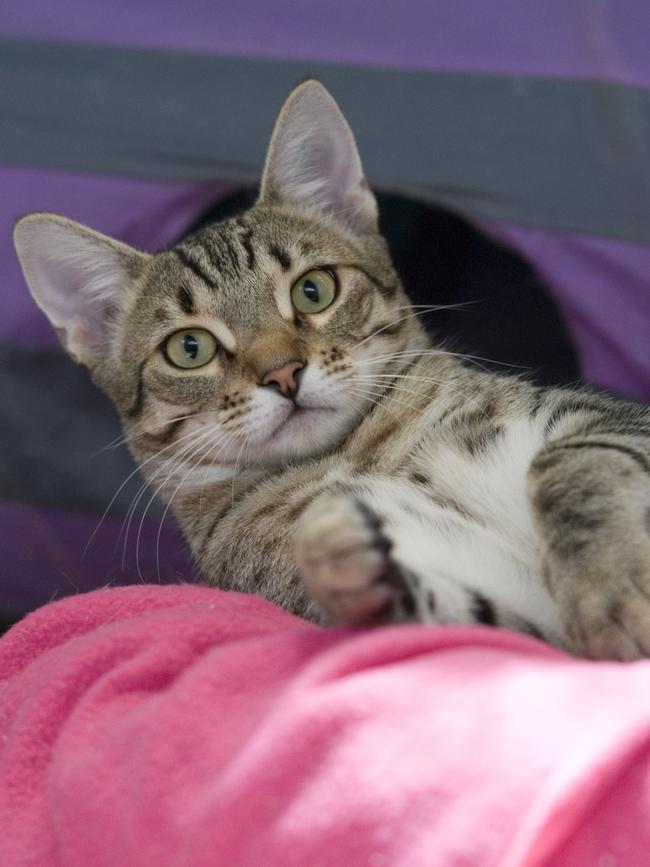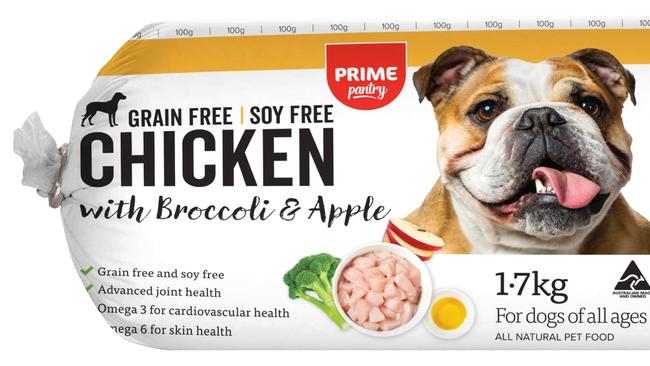Why this petfood dream’s nothing to kibble about
It was the week that changed Tzena Naarden’s life forever. After working with dad Ray to build a pet food business, private equity came knocking. Here’s how it played out.

The first week of May 2021 changed the life of Tzena Naarden forever.
After seven years building the premium pet food brand Prime100, she and her 71-year-old father, Ray Rivett, sold a controlling stake in their business to the Chris Hadley-chaired Quadrant Private Equity at a reported valuation of more than $150m.
That day she and Rivett, who uprooted his life to support his daughter’s vision for the business, crystallised wealth they had only ever dreamt of.
“Dad was pretty happy. I think he gave a sigh of relief that he didn’t have to work so hard,” she says.
“It felt a little bit like ‘Is this real?’ You never think this will happen to you. It did feel very surreal.”
But Naarden was not only an entrepreneurial business owner. At the time she was a 42-year-old mother with two children under seven years of age.
She acknowledges that the extra money in her bank account “took the pressure off”.
“It allows your family to do more things, but I’m not an overly materialistic person to be honest. So that wasn’t my focus,” she says.
“I just wanted to get back to work.”
Prime100 received its first approaches from potential private equity investors in late 2020. The firm got to know a few of them and their advisers. But Naarden didn’t think the business was ready for external capital.

Over the previous decade she and her father had watched Quadrant take a shareholding in Greencross, Australia’s biggest pet-care company.
Quadrant also purchased VIP Petfoods in 2015 for $410m, expanded the operations and renamed it the Real Petfood Company before selling it two years later.
In early 2021 Quadrant was revealed to Prime100 as one of its prospective suitors. Naarden and her father could not have been happier.
“We’d actually really liked what they had done and we had heard some good things about them,” she recalls.
“We had seen what they had done with other firms in the pet industry. So they were the ones that we actually wanted to talk to.”
The due diligence took less than six weeks, which was the shortest process Quadrant had ever undertaken for an acquisition.
“I had never been through a process like that. We had a figure in mind and that was the figure we sold a 55 per cent stake in the business for. We knew what it was worth. They also saw the upside,” Naarden says.
The private equity group was advised by KPMG, and Prime100 by a Brisbane-based chartered accounting firm named Pilot Partners.
Quadrant made its investment via its $400m Quadrant Growth Fund. The firm’s investment director, Peter Elkhouri, who oversaw the deal, joined the Prime100 board. One of the firm’s partners, Marcus Darville, became chairman.
The other two directors of Prime100 are Naarden and her co-founder, entrepreneur and family friend Michael Pond.
What started as a five-member team in 2014 has now grown to 145 staff under Quadrant’s ownership. The firm’s revenue has nearly trebled over the past three years.
“It’s been a pleasure partnering with Tzena, Ray, Mike and the team at Prime100. With the founders, we have been able to build on this great Australian success story, now one of the largest private petfood companies in the country and on track to triple in scale since our partnership,” Mr Elkhouri says.
“Prime100 has a phenomenal management team and has the infrastructure in place to continue being the category growth leader across chilled, wet, and premium specialty petfood products both here and offshore.”
From little things big things grow
Naarden hails from Hamilton, the capital of Victoria’s Western District, which is renowned for its high-quality pasture and wool.
For many years her father ran his own business in the wool, skins and meat trades.
But when she was three years old her parents divorced. Her father remarried and Naarden grew up living with her mother.
After boarding at St Catherine’s College in Toorak and a stint at university studying marketing, at the age of 23 she returned to the Western District – in part to get to know the dad she barely knew.
In 1998 Rivett had started a firm called Petfood Processors of Camperdown, based 120km from Hamilton, which produced petfood from feedstock sourced from farms around Victoria.
Naarden started working with her father in the business, focused on marketing. She also built a side hustle by providing pet specialty retailers in the Western District with fresh food products.
Her refrigerated pet food rolls were specially designed for cats and dogs suffering from itching, belching, and digestive issues stemming from food-based irritations and allergens.
She called it Prime.
In 2013, after turning 64, Rivett decided to sell Petfood Processors and retire. But his daughter had other ideas.
“He’s one of those men who just keeps going. He is constantly hands-on, doing something. He was living in the country and I said ‘I’ve kept my little brand that I started. Let’s turn this brand into something and move to Melbourne,” she recalls telling him.
“His biggest skill was operations and manufacturing. Dad’s never shy of a challenge. So he thought, ‘Yeah, let’s do it’.”

The youngest child of Rivett’s second marriage was still in school when he uprooted the family to Melbourne to support his eldest daughter’s dream. He and Naarden soon found a factory at Fairfield in the city’s northeast to build their manufacturing facility.
Together with Michael Pond they put their all into building the premium pet food brand they called Prime100: Prime meant the best quality cuts of meat, 100 stood for 100 per cent quality.
After collaborating with dermatologists, veterinarians and nutritionists, they launched their premium pet food brand in 2014.
It now specialises in premium single protein products which are designed to help dogs and cats that have potential allergies.
Single-protein diets are considered low allergen. In the single protein product range, the firm’s biggest seller is a kangaroo and pumpkin roll, which sells for about $15 for a 2kg roll in specialty pet shops.
“I think it’s estimated that one in three dogs have a food sensitivity. That is why these single-protein diets are so imperative,” Naarden says.
“That is our skill set and no one else has been able to compete with us in that.”
More recently, Prime100 has launched more mainstream, healthy diet petfood products in Coles and Woolworths through its sister brand called PrimePantry.
Prime100’s growth was supercharged in the pandemic, as dog ownership in Australia passed the nine million mark.
Although Covid-19 also brought major disruptions to supply chains, labour, and cost inflation, instead of cutting costs the firm decided to invest in branding and as a result has generated nearly 40 per cent average year-on-year growth since 2020.
Outside help that’s creating an international brand
Last year Prime100 appointed former Mars Petcare executive Jason Gray as its first external CEO – a move driven by Quadrant. The private equity firm also drove the recruitment of a new chief financial officer.
Naarden was supportive of the move.
“Quadrant always said they would strengthen our team and bring in different skills sets. Jason has come from a corporate background into a family business, so it was an eye opener for him,” she says. “But he has been brilliant.”
Gray attends all board meetings, as does the CFO, even though they are not formally on the board.
Naarden now calls herself simply “a director” of the company. But she will always be the co-founder.
Her vision is to target more offshore markets, and turn an Australian manufacturing success story into an acclaimed exporter.
Prime100 now sells products in Singapore, Japan and North America. The latter market launch took place earlier this year and the rolls are made onsite in the US.

“It is a huge market. No one else over there is doing these diets. The dogs are the same around the world. If you can replicate this in other countries, it is a huge opportunity,” she says.
She wants Prime100 to become a global household brand known for quality pet diets which are functional and for purpose, rather than being just another generic pet food company.
She is agnostic as to whether the firm stays in private hands or eventually lists on the Australian Securities Exchange when her private equity backers inevitably choose to exit.
In January 2023 Naarden and her family moved to Philip Island from their home in Port Melbourne after her husband, Jonas, sold his business.
They took with them Naarden’s Bordoodle named “Bear” and a little tabby cat called “Great Tree Smiley Face”.
For the next 12 months she commuted to Melbourne for four days a week. But this year she is spending more time on Philip Island.
Naarden says Rivett is, so far, enjoying his experience with Quadrant.
“We were very apprehensive with PE because you don’t know what they will be like, but this has been fantastic. Dad has really enjoyed it,” she says.
“They have been very good at building a strong team so the growth keeps going in the business. But Quadrant are also very good about letting you have a voice as a founder.”

She and her father talk twice a day, in the morning and at night, even if they only meet face to face for a meal sometimes just once a month. He is still, what she calls, her “bouncing board”.
“We just have this way of working together. It’s been amazing. He’s very much open to ideas and to suggestions and he loves a challenge,” she says.
She reckons her greatest lesson from her father has been to never give up.
Rivett’s determination to succeed served him well for decades in his own business. Now that drive has rubbed off on his eldest daughter.
But perhaps his most important gift to her has been to always be positive; to always smile, even when the chips are down.
“He is a determined man. He will have a go and keep going. Dad has always worked hard to get where he wanted to get to,” she says.
“But at the end of the day, we always had a laugh. Even if it was the most horrible day imaginable.
“He has always said ‘Stick together and just have a good laugh before you go home’, whatever the situation. So then you get up the next morning and with grit and with passion, you do it again.”






To join the conversation, please log in. Don't have an account? Register
Join the conversation, you are commenting as Logout